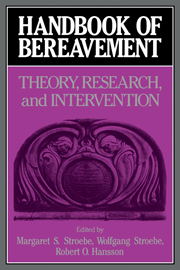Book contents
- Frontmatter
- Contents
- Contributors
- Preface
- Part I Introduction
- Part II The phenomenology and measurement of grief
- Part III Current theories of grief, mourning, and bereavement
- Part IV Physiological changes following bereavement
- Part V The psychological, social, and health impacts of conjugal bereavement
- Part VI Grief reactions to different types of loss
- 18 Loss and recovery
- 19 The death of a child is forever: The life course impact of child loss
- 20 Children's reactions to the death of a parent
- 21 Bereavement following death from AIDS: Unique problems, reactions, and special needs
- 22 Sleep and dreams in well-adjusted and less adjusted Holocaust survivors
- Part VII Coping, counseling, and therapy
- Part VIII Conclusions
- References
- Author index
- Subject Index
19 - The death of a child is forever: The life course impact of child loss
Published online by Cambridge University Press: 04 May 2010
- Frontmatter
- Contents
- Contributors
- Preface
- Part I Introduction
- Part II The phenomenology and measurement of grief
- Part III Current theories of grief, mourning, and bereavement
- Part IV Physiological changes following bereavement
- Part V The psychological, social, and health impacts of conjugal bereavement
- Part VI Grief reactions to different types of loss
- 18 Loss and recovery
- 19 The death of a child is forever: The life course impact of child loss
- 20 Children's reactions to the death of a parent
- 21 Bereavement following death from AIDS: Unique problems, reactions, and special needs
- 22 Sleep and dreams in well-adjusted and less adjusted Holocaust survivors
- Part VII Coping, counseling, and therapy
- Part VIII Conclusions
- References
- Author index
- Subject Index
Summary
With few exceptions, parents are able to love and care deeply for all their children, whether these be few or many in number. In times of life crisis, parents may become temporarily unable to find the resources within themselves to actively manage their relationships with their children, but this situation is generally time limited. The capacity for parents to care deeply for each child and to find different but balanced ways of involvement with each of their children is the norm. That is, unless a child in the family dies. In that situation, the capacity for parents to undergo a normal mourning process in which they will grieve for the deceased child and emerge able to continue meaningful and balanced interaction with the surviving children is far from assured. In all too many cases, the parents maintain a continuing preoccupation with and heightened investment in the relationship to the lost one and the loss itself.
The book of Genesis is rich in the description of family themes that would prove taxing for even the most resourceful of family therapists. Of all the stories of loss, the one of Jacob mourning for his beloved favorite son Joseph, presumed dead, is prototypical for one complication of parent loss of children. Although favored in life, it is Joseph's sudden “death” that cripples the father emotionally so that he is a mere shell of himself.
- Type
- Chapter
- Information
- Handbook of BereavementTheory, Research, and Intervention, pp. 285 - 299Publisher: Cambridge University PressPrint publication year: 1993
- 59
- Cited by



